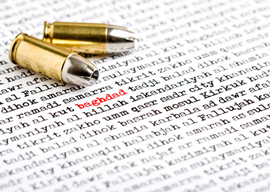
July 06, 2014

Source: Shutterstock
Perhaps the principal victim of the story, Mushtaq, had himself also been horribly cruel or vicious in his days (if any) as a terrorist: though even if we knew that he had, we could not altogether withdraw our sympathy from him in the terror, but also dignity, of his last moments. The story also illustrates that there are vices considerably worse than financial corruption. We do not really think the worse of the prison guard in these circumstances who was bribed to allow Mushtaq a telephone, or more highly of the man who took his telephone when he did not accede to a request compliance with which would have paid him handsomely. Though far from unprecedented in human history, this joyful, conscienceless appropriation of the dead man’s phone was enough to make one despair of the human race. O brave new world that has such creatures in it”except of course that there is nothing at all new about it.
Technical advance in the midst of barbarism, how often have we had the occasion to remark upon it! Accompanying the article in the newspaper that told the story of Mushtaq was a photograph of some ISIS fighters entering Mosul. Though dedicated to restoring the seventh-century caliphate, or perhaps the rule of the Ba”ath party, or some combination of the two, they did not disdain to ride into town on a modern high-tech military vehicle, some of them wearing sunglasses, all of them brandishing not scimitars but AK-47s, or some such weapons.
What really caught my attention in the photograph, however, were the four pedestrians by the side of the road as the vehicle with the triumphant jihadists rode by. Three of them were taking pictures of the scene with their phones. It was as if what was happening was real for them only if seen though a lens and on a screen, or as if the world seen directly, not through a lens, was a little too strong for their eyes, like the sun.
It is possible that they thought they were recording for posterity, including their own, what they knew to be an historic moment, but I rather doubt it. No; they were taking pictures in exactly the same way that they, and millions of others, now take pictures of a meal in a restaurant or a holiday parade in a street. Where everything can be so easily recorded, all events are equal. Except, of course, that they are not.